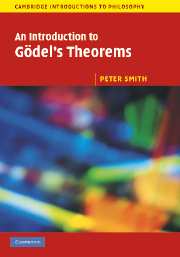Book contents
- Frontmatter
- Contents
- Preface
- 1 What Gödel's Theorems say
- 2 Decidability and enumerability
- 3 Axiomatized formal theories
- 4 Capturing numerical properties
- 5 The truths of arithmetic
- 6 Sufficiently strong arithmetics
- 7 Interlude: Taking stock
- 8 Two formalized arithmetics
- 9 What Q can prove
- 10 First-order Peano Arithmetic
- 11 Primitive recursive functions
- 12 Capturing p.r. functions
- 13 Q is p.r. adequate
- 14 Interlude: A very little about Principia
- 15 The arithmetization of syntax
- 16 PA is incomplete
- 17 Gödel's First Theorem
- 18 Interlude: About the First Theorem
- 19 Strengthening the First Theorem
- 20 The Diagonalization Lemma
- 21 Using the Diagonalization Lemma
- 22 Second-order arithmetics
- 23 Interlude: Incompleteness and Isaacson's conjecture
- 24 Gödel's Second Theorem for PA
- 25 The derivability conditions
- 26 Deriving the derivability conditions
- 27 Reflections
- 28 Interlude: About the Second Theorem
- 29 µ-Recursive functions
- 30 Undecidability and incompleteness
- 31 Turing machines
- 32 Turing machines and recursiveness
- 33 Halting problems
- 34 The Church–Turing Thesis
- 35 Proving the Thesis?
- 36 Looking back
- Further reading
- Bibliography
- Index
22 - Second-order arithmetics
Published online by Cambridge University Press: 05 June 2012
- Frontmatter
- Contents
- Preface
- 1 What Gödel's Theorems say
- 2 Decidability and enumerability
- 3 Axiomatized formal theories
- 4 Capturing numerical properties
- 5 The truths of arithmetic
- 6 Sufficiently strong arithmetics
- 7 Interlude: Taking stock
- 8 Two formalized arithmetics
- 9 What Q can prove
- 10 First-order Peano Arithmetic
- 11 Primitive recursive functions
- 12 Capturing p.r. functions
- 13 Q is p.r. adequate
- 14 Interlude: A very little about Principia
- 15 The arithmetization of syntax
- 16 PA is incomplete
- 17 Gödel's First Theorem
- 18 Interlude: About the First Theorem
- 19 Strengthening the First Theorem
- 20 The Diagonalization Lemma
- 21 Using the Diagonalization Lemma
- 22 Second-order arithmetics
- 23 Interlude: Incompleteness and Isaacson's conjecture
- 24 Gödel's Second Theorem for PA
- 25 The derivability conditions
- 26 Deriving the derivability conditions
- 27 Reflections
- 28 Interlude: About the Second Theorem
- 29 µ-Recursive functions
- 30 Undecidability and incompleteness
- 31 Turing machines
- 32 Turing machines and recursiveness
- 33 Halting problems
- 34 The Church–Turing Thesis
- 35 Proving the Thesis?
- 36 Looking back
- Further reading
- Bibliography
- Index
Summary
As we noted in Section 10.1, the intuitive principle of mathematical induction looks to be a second-order principle that quantifies over numerical properties, and which can't be directly expressed in a first-order theory that only quantifies over numbers. So you might well be wondering: why not work with a second-order arithmetic, rather than hobble ourselves by artificially forcing our formal arithmetic into a first-order straightjacket? True, we now know that – so long as it stays consistent and properly axiomatized – a richer theory won't entirely escape the reach of the Gödel-Rosser Theorem, any more than a first-order theory can. But still, we ought to say at least a little about second-order arithmetics.
Indeed, there is a pressing issue about such theories which really needs to be addressed head on at this point. For if you have done a standard university algebra course, you might very well be feeling pretty puzzled by now. Such a course typically introduces axioms for some version of ‘Second-order Peano Arithmetic’, and there is an elementary textbook proof that these axioms pin down a unique type of structure. But if this second-order arithmetic does pin down the structure of the natural numbers, then – given that any arithmetic sentence makes a determinate claim about this structure – it apparently follows that this theory does enough to settle the truth-value of every arithmetic sentence. Which makes it sound as if there can after all be a (consistent) negation-complete axiomatic theory of arithmetic richer than first-order PA, flatly contradicting the Gödel-Rosser Theorem.
Information
- Type
- Chapter
- Information
- An Introduction to Gödel's Theorems , pp. 186 - 198Publisher: Cambridge University PressPrint publication year: 2007
